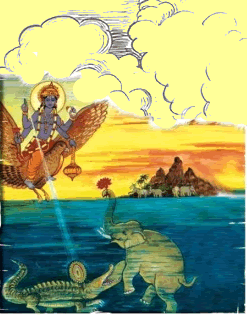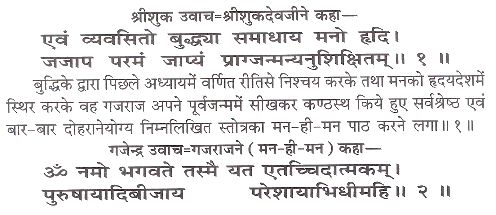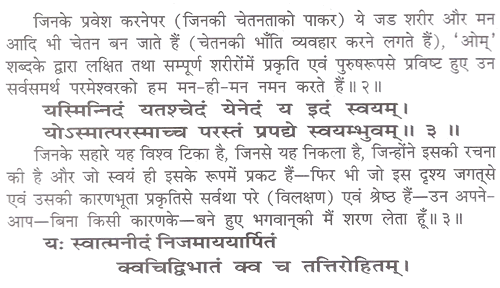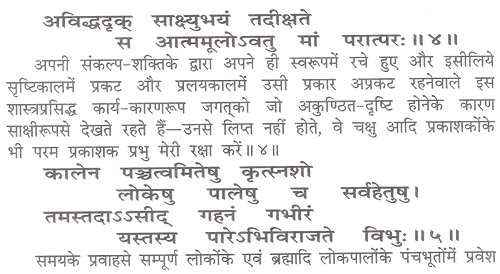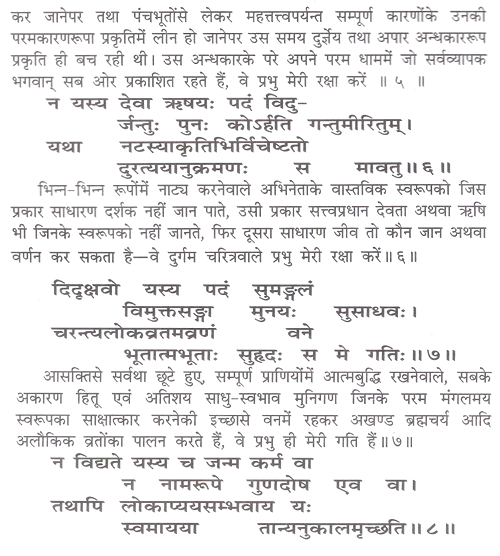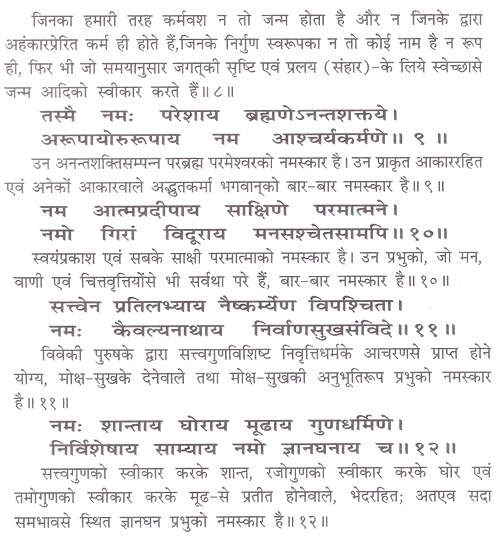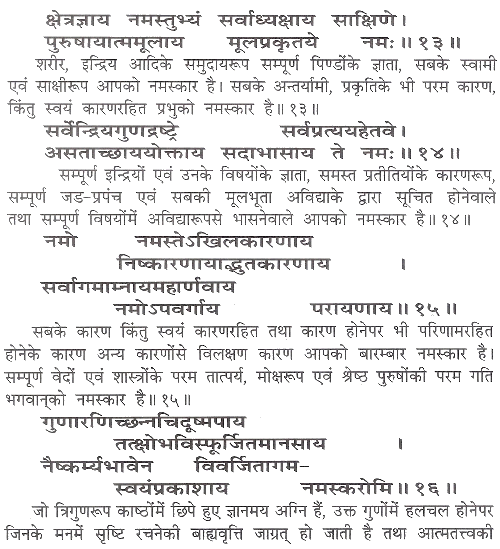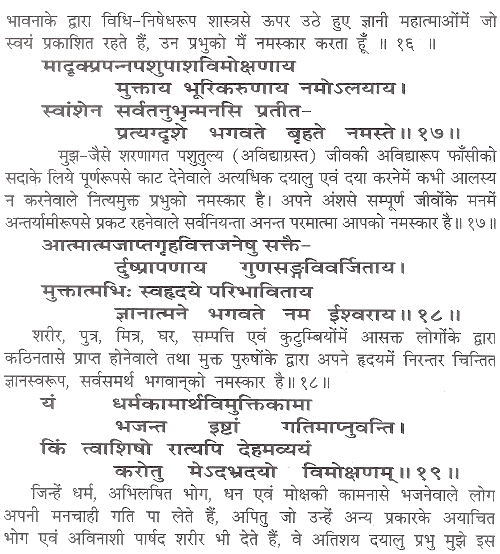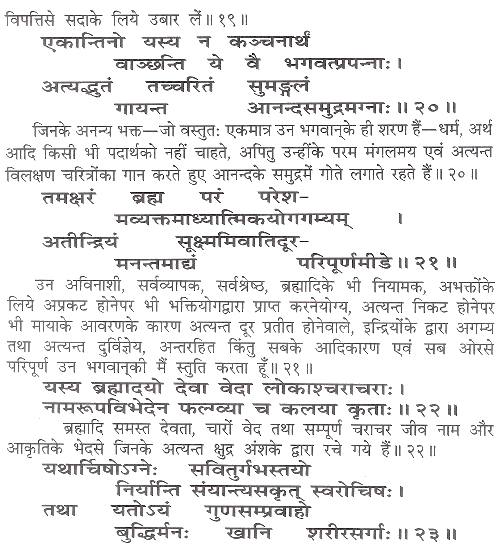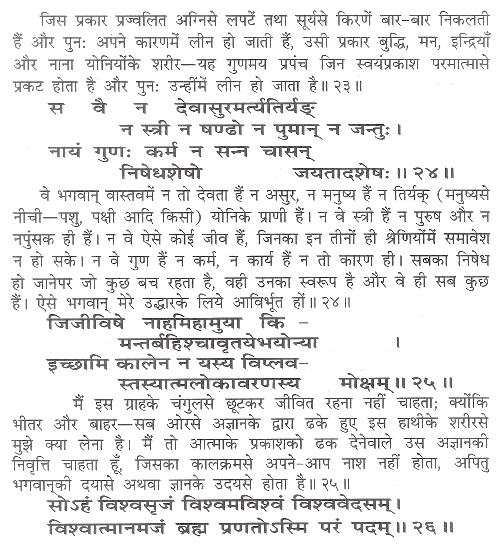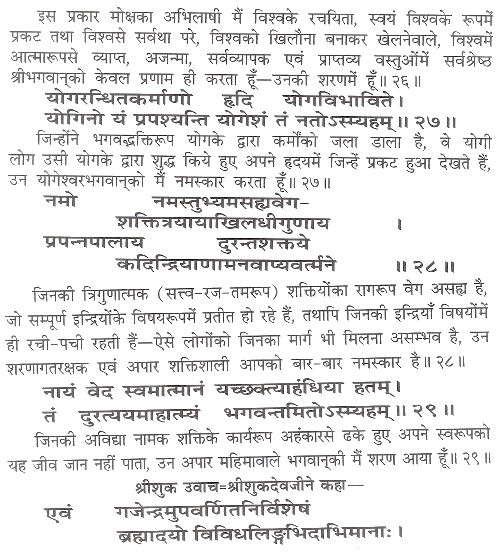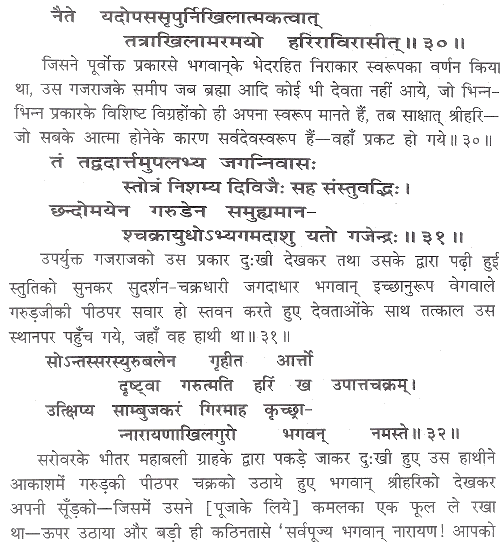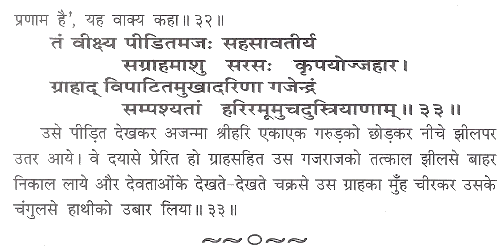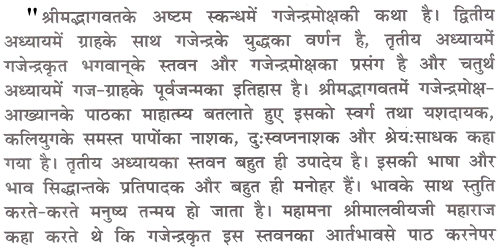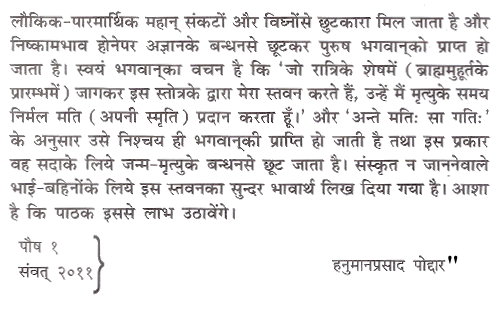CHATUSLOKI BHAGAVATAM (Vishnu stotra.81)
https://youtu.be/StQcxc2UBmQ===========
Chatusloki Bhagavatam
In four verses found in the ninth chapter of the second canto ( Verse 30 to Verse 36
) of the Srimad Bhagavatam, Lord Krishna pleased by Brahmaji's penance, tells him the entire essence of Srimad Bhagavatam.
CHATUSLOKI BHAGAVATAM IS THE ESSENCE OF SRIMAD BHAGAVATAM. IT IS FOUND IN JUST FOUR VERSES IN THE 2 nd CANTO OF BHAGAVATAM. THESE VERSES WERE ORIGINALLY TAUGHT BY LORD NARAYANA TO BRAHMA AND WAS PASSED ON TO NARADA MUNI , VYASA MAHARSHI,HIS SON SUKHA.MAHARSHI.THE "OM" TATWAM IS VERY MUCH VISIBLE IN CHATUSLOKI BHAGAVATAM.
1st VERSE TELLS ABOUT THE "BRAHMA TATVAM"
2nd VERSE TELLS ABOUT THE "JAGAT TATVAM"
3rd VERSE TELLS ABOUT THE "MAYA TATVAM"
4th VERSE TELLS ABOUT THE "ATMA TATVAM"
WHICH IS THE ESSENCE OF ALL THE SPIRUTUAL LEARNING AND ALL THESE FOUR TATWAMS FORM PARTS OF THE PRANAVA MANTRA "OM".
CHATUSLOKI BHAGAVATAM IS THE ESSENCE OF SRIMAD BHAGAVATAM. IT IS FOUND IN JUST FOUR VERSES IN THE 2 nd CANTO OF BHAGAVATAM. THESE VERSES WERE ORIGINALLY TAUGHT BY LORD NARAYANA TO BRAHMA AND WAS PASSED ON TO NARADA MUNI , VYASA MAHARSHI,HIS SON SUKHA.MAHARSHI.THE "OM" TATWAM IS VERY MUCH VISIBLE IN CHATUSLOKI BHAGAVATAM.
1st VERSE TELLS ABOUT THE "BRAHMA TATVAM"
2nd VERSE TELLS ABOUT THE "JAGAT TATVAM"
3rd VERSE TELLS ABOUT THE "MAYA TATVAM"
4th VERSE TELLS ABOUT THE "ATMA TATVAM"
WHICH IS THE ESSENCE OF ALL THE SPIRUTUAL LEARNING AND ALL THESE FOUR TATWAMS FORM PARTS OF THE PRANAVA MANTRA "OM".
.. chatuHshlokIbhAgavatam ..
॥ चतुःश्लोकीभागवतम् ॥
श्रीभगवानुवाच ।
ज्ञानं परमगुह्यं मे यद्विज्ञानसमन्वितम् ।
सरहस्यं तदङ्गं च गृहाण गदितं मया ॥ १॥
यावानहं यथाभावो यद्रूपगुणकर्मकः ।
तथैव तत्त्वविज्ञानमस्तु ते मदनुग्रहात् ॥ २॥
अहमेवासमेवाग्रे नान्यद्यत्सदसत्परम् ।
पश्चादहं यदेतच्च योऽवशिष्येत सोऽस्म्यहम् ॥ ३॥
ऋतेऽर्थं यत्प्रतीयेत न प्रतीयेत चात्मनि ।
तद्विद्यादात्मनो मायां यथाऽऽभासो यथा तमः ॥ ४॥
यथा महान्ति भूतानि भूतेषूच्चावचेष्वनु ।
प्रविष्टान्यप्रविष्टानि तथा तेषु न तेष्वहम् ॥ ५॥
एतावदेव जिज्ञास्यं तत्त्वजिज्ञासुनाऽऽत्मनः ।
अन्वयव्यतिरेकाभ्यां यत्स्यात्सर्वत्र सर्वदा ॥ ६॥
एतन्मतं समातिष्ठ परमेण समाधिना ।
भवान्कल्पविकल्पेषु न विमुह्यति कर्हिचित् ॥ ७॥
॥ इति श्रीमद्भागवते महापुराणेऽष्टादशसाहस्र्यां
संहितायां वैयसिक्यां द्वितीयस्कन्धे भगवद्ब्रह्मसंवादे
चतुःश्लोकीभागवतं समाप्तम् ॥
https://youtu.be/GIuJGsO24YI
Bhagavatapurana 2.09-30-36
॥ ଚତୁଃଶ୍ଲୋକୀଭାଗଵତମ୍ ॥
ଶ୍ରୀଭଗଵାନୁଵାଚ ।
ଜ୍ଞାନଂ ପରମଗୁହ୍ୟଂ ମେ ୟଦ୍ଵିଜ୍ଞାନସମନ୍ଵିତମ୍ ।
ସରହସ୍ୟଂ ତଦଙ୍ଗଂ ଚ ଗୃହାଣ ଗଦିତଂ ମୟା ॥ ୧॥
ୟାଵାନହଂ ୟଥାଭାଵୋ ୟଦ୍ରୂପଗୁଣକର୍ମକଃ ।
ତଥୈଵ ତତ୍ତ୍ଵଵିଜ୍ଞାନମସ୍ତୁ ତେ ମଦନୁଗ୍ରହାତ୍ ॥ ୨॥
ଅହମେଵାସମେଵାଗ୍ରେ ନାନ୍ୟଦ୍ୟତ୍ସଦସତ୍ପରମ୍ ।
ପଶ୍ଚାଦହଂ ୟଦେତଚ୍ଚ ୟୋଽଵଶିଷ୍ୟେତ ସୋଽସ୍ମ୍ୟହମ୍ ॥ ୩॥
ଋତେଽର୍ଥଂ ୟତ୍ପ୍ରତୀୟେତ ନ ପ୍ରତୀୟେତ ଚାତ୍ମନି ।
ତଦ୍ଵିଦ୍ୟାଦାତ୍ମନୋ ମାୟାଂ ୟଥାଽଽଭାସୋ ୟଥା ତମଃ ॥ ୪॥
ୟଥା ମହାନ୍ତି ଭୂତାନି ଭୂତେଷୂଚ୍ଚାଵଚେଷ୍ଵନୁ ।
ପ୍ରଵିଷ୍ଟାନ୍ୟପ୍ରଵିଷ୍ଟାନି ତଥା ତେଷୁ ନ ତେଷ୍ଵହମ୍ ॥ ୫॥
ଏତାଵଦେଵ ଜିଜ୍ଞାସ୍ୟଂ ତତ୍ତ୍ଵଜିଜ୍ଞାସୁନାଽଽତ୍ମନଃ ।
ଅନ୍ଵୟଵ୍ୟତିରେକାଭ୍ୟାଂ ୟତ୍ସ୍ୟାତ୍ସର୍ଵତ୍ର ସର୍ଵଦା ॥ ୬॥
ଏତନ୍ମତଂ ସମାତିଷ୍ଠ ପରମେଣ ସମାଧିନା ।
ଭଵାନ୍କଲ୍ପଵିକଲ୍ପେଷୁ ନ ଵିମୁହ୍ୟତି କର୍ହିଚିତ୍ ॥ ୭॥
॥ ଇତି ଶ୍ରୀମଦ୍ଭାଗଵତେ ମହାପୁରାଣେଽଷ୍ଟାଦଶସାହସ୍ର୍ୟାଂ
ସଂହିତାୟାଂ ଵୈୟସିକ୍ୟାଂ ଦ୍ଵିତୀୟସ୍କନ୍ଧେ ଭଗଵଦ୍ବ୍ରହ୍ମସଂଵାଦେ
ଚତୁଃଶ୍ଲୋକୀଭାଗଵତଂ ସମାପ୍ତମ୍ ॥
Bhagavatapurana 2.09-30-36
The Essence of Bhagavatam

 "OM"
is the Pranava Mantram described in the Vedas , which is the base for
all the Shastras of Hinduism. "Om Namo Narayanaya" "Om Namah Shivaya"
"Om Shakthi" ....all the Moola Mantras start with the word "OM". And it
stands for all that is revealed in the 18 puranas, Ithihasas and other
smruthies and shruthies.That is the Tattwam of the Bhagavatham, the
absolute Truth, the Mahat Gnanam, and the learned ones think that
Tattwam is called "Brahman" by the realised souls and "Paramatma" by the
Yogies and "Bhagvan" by the Bhakthas, devotees.
"OM"
is the Pranava Mantram described in the Vedas , which is the base for
all the Shastras of Hinduism. "Om Namo Narayanaya" "Om Namah Shivaya"
"Om Shakthi" ....all the Moola Mantras start with the word "OM". And it
stands for all that is revealed in the 18 puranas, Ithihasas and other
smruthies and shruthies.That is the Tattwam of the Bhagavatham, the
absolute Truth, the Mahat Gnanam, and the learned ones think that
Tattwam is called "Brahman" by the realised souls and "Paramatma" by the
Yogies and "Bhagvan" by the Bhakthas, devotees." Vadanti Tat Tatwa Vidah: Tattwam Yat Gnanam Advayam,
Brahmeti Paramatmeti Bhagwan Iti Shabyathe."...1/2/11
".....Dhrushta Eva Aatmameesware".......1/2/21
This is the essence of Sreemad Bhagavatam, which was first instructed to Brahmaji by the Lord Himself and which Brahmaji described to Narada Maharshi and Narada gave to Veda Vyasaji in the form of the Chatur Sloki Bhagavat. Veda Vyasaji was found very unhappy even after writing the 17 Puranas and the four Vedas and the Mahabarat,which is known as the fifth veda. Naradaji advised him to write the Bhagavatam containing all the stories of the Lord and more importantly that of His Devotees.The "OM" tattwam is very much visible in the chatur Sloki Bhagavatam.The first verse speaks about the "Brahma Tattwam",the second one tells about the "Jagat Tattwam", the third one about the "Maya Tattwam, and the last one explains about the "Aatma Tattwam" which is the essence of all the Spiritual Learning and all these four form parts of the Pranava Mantra "OM".Let us see these verses in details........
" Aham Eva Aasam Eva Agre,Na Anyat Yat Sat Asat Param,
Paschat Aham Yat Etat Cha, Yah: Avashishyeta Sah: Asmi Aham"
Here the Lord Tells Brahmaji, that before the creation of this Jagat only He was existing, nothing else, and what he is seeing now in this Jagat is only He,and at the end of the Maha Pralaya only He will be existing and nothing else will.That is why He is called the Sarva Vyapi, Vishnu. In the Bhagavat Geetha, Lord Krishna is clearly stating that He is residing in every living being. The Upanishads declare that "Esa Vasyam Ithagum Sarvam", that the Lord resides in every thing in this Jagat.This is the Brahma Tattwam, Jagat Guru Shankaracharya said that the whole Jagat is Mithya, Maya and only the Brahmam is Satyam, it is only truly existing. Or as the Lord was alone before the creation of this Jagat, He thought of making this World with His Sankalpam, and just as the Spider makes it's web by it's own materials, God created this World with His own materials, meaning that what ever we see in this Jagat is the part and parcel of the Lord Himself. That is "Brahma Tattwam" we understand here.
Then comes the question,if that is "Brahmam" what is this Maaya? In this connection the Bhagavatkar says.....
"Rite artham yat pratiiyeta, na pradiiyeta cha aatmani,
Tat vidyaat aatmanah: maayaam, yathaa aabhaasah: yathaa tamah:"
Here Bhagavan tells Brahma that what ever appears to be true or of some value,if it is not related to me then it is not real or it's false. It is actually my illusory energy called the Maayaa,it is actually like a reflection in darkness.That is the Maayaa Tatwam. It is like the reflection of a Moon in a pond, which is only illussion which makes one believe that there are two Moons. Or like the Graha Rahu , Tamo-rupa,which even though present among the Grahas it does not shine like one.
The first said Asat object's light, the reflected Moon's rays, and the second said Sat object's darkness, the Rahu's non-illumination, represends the Maayaa, which is the Lord's illussory Energy. It is the power of hiding a real thing called Aavarana Shakthi,and the power of showing something which is not there ,called Vikshepa Shakthi. That is ".....yathaa aabhasah: and yathaa tamah:" However a Sane person a learned person knows that it is the power of the Lord, maayaa is also an energy emanating from the Lord Himself. Only a less learned person will only come into the direct influence of this Maayaa. In explaining this, He has to mention what is then the Jagat, Universe, is.............."Yathaa Mahaanti bhuutani, bhuuteshu uchcha avaseshu anu,
Pravishtaani apravishtaani tathaa teshu na teshu aham"
God tells Brahmaji that just as,all the material elements of this Jagat are visible after the creation are called the Pravishtas and they were existing in the form of a cause even before the creation and hence called the Apravishtas, I too, as I'm present in every creation internally, Antheryaami, am a pravishta and as I did existed even before the creations of the Jagat, I am Apravishta too. Or The Lord is in everything in this Jagat internally, at the same time He's outside of all these elements. This is the Jagat Tatwam. The Lord is very specific in telling us that He's in every creation, as a part of that thing and at the same time all these things are not in Him. He is pervaded by the entire Universe, He's the part and parcel of every thing in this world. In Bhagavat Geeta too Lord is clear in telling that He's in every creation but none is in Him. As we do, Brahmaji too would have got confused with these terms as Brahma Tatwam Maayaa Tatwam and Jagat Tatwam, that is the reason why the Lord ends His Chatur Sloki Bhagavatam with the clear and real essence of the Bhagavatam, what is the real existence of the whole Universe and the whole of creations, what is the actual Truth is...................
"Etaavad eva jignaasyam, tattwa jignasunaa aatmanah:
anvaya vyatirekaabhyam, yat syaat sarvatra sarvadaa"
This is the Pranava Tatwam we started this post with. It explains the whole Truth as to what we are and what we stand for. Here the Lord says that all those who are the Jignasus, those who are searching for the Absolute Truth, will end their search with the knowledge that in all circumstances and in all the space and times and directly or indirectly the Paramatma is resting in all the living beings in the form of Atma and the whole Truth of the matter is the Chaitanya in each and every creation is the part of the Paramatma, however infinitesmal measure He may be present there.
Directly or indirectly what is always everywhere existing,or what is true, that Param Aatma Tattwam only is the ultimate goal of all the Satya Anveshies, the Jignasus.
Aatma is the Truth which one is seeking to find. It is like, the Gold is the atma, or real thing in all the ornaments and we search for ornaments . And those who know this Truth for them.."Bhidyate hridaya grantihi:,chidyante sarva samshayaha:
Kshiyante chasye karmani, dhrushta eva aatmaneeswaraha:"
This is "OM" the basic Aatma of every creation of this world and according to us this is the True essence of Bhagavata Purana. This Chatusloki Bhagavat was given to Brahmaji by the Lord Himself and Brahma transferred it to Narada and Narada in turn gave to Veda Vysasa Rishi who expanded this four slokas into about 18,000 verses of Sreemad Bhagavatam. So this Bhagavatam is the Vangmayi Roopam of Bhagavan Sree Krishna Himself.

